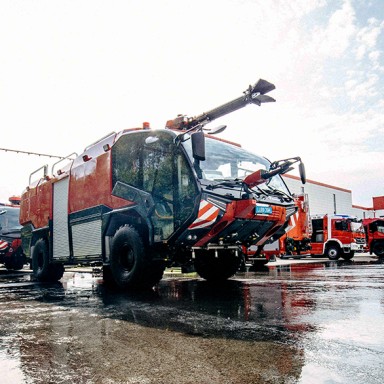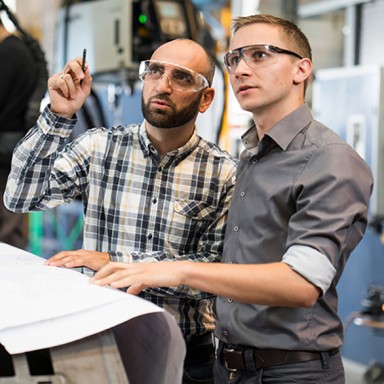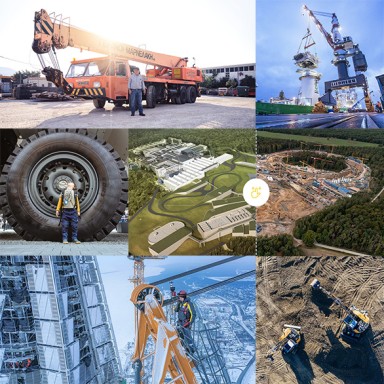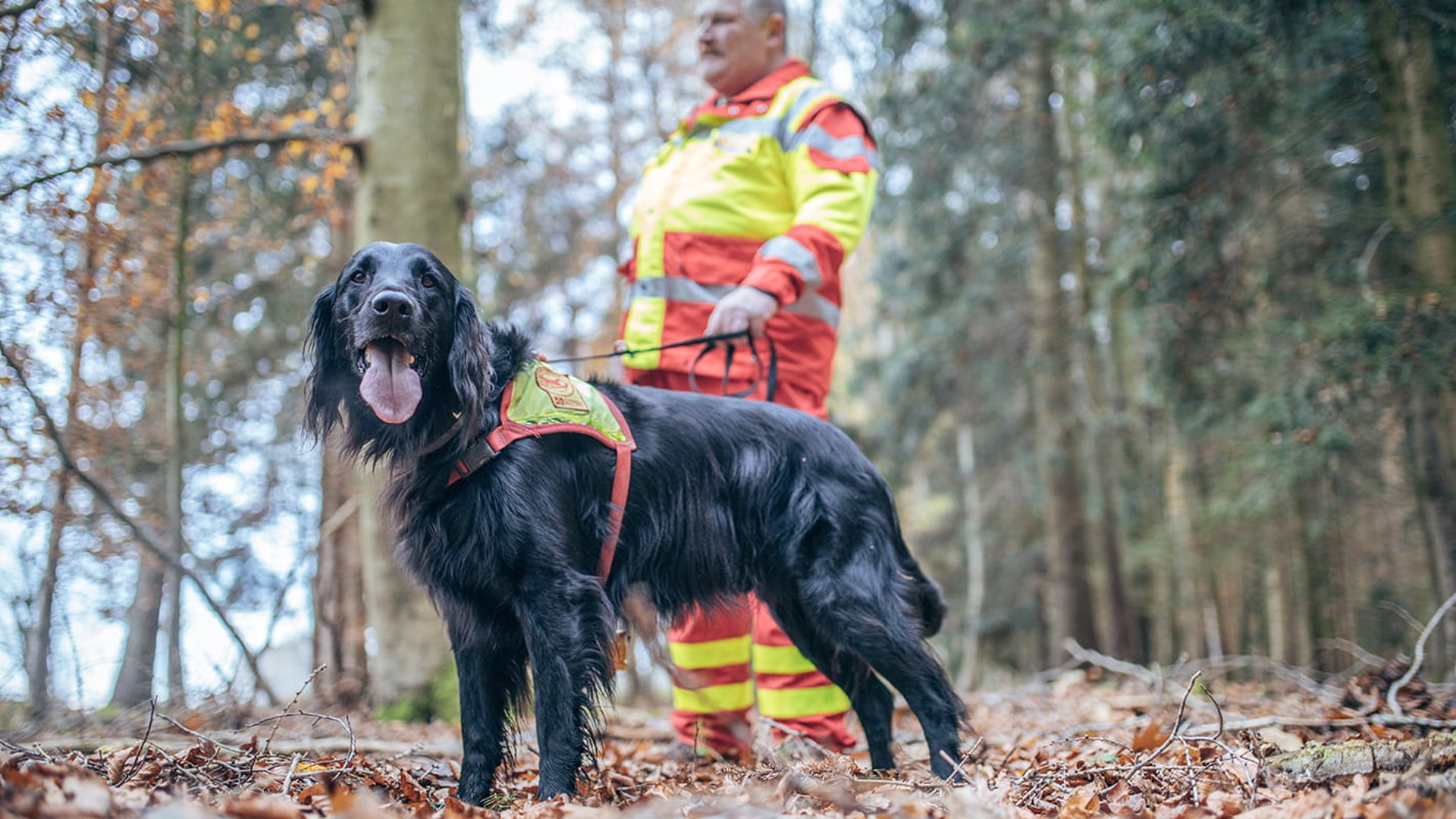
9 minutes reading time
Dedication to volunteer
They extinguish fires, break open crashed cars, search for missing persons, provide first aid. As soon as the beeper goes, they leave everything standing and lying and set off - day or night, at work or at a family party, in sub-zero temperatures or boiling heat. And all this voluntarily and without payment.
Full commitment
Carola Rauscher, Alexander Loretz and Thomas Wöhr are three of many Liebherr employees who volunteer. Thomas Wöhr has been active in the dog rescue unit for more than seven years. If a person is missing in the Biberach area, he and the team of the ASB Orsenhausen Rescue Dog Unit move out. Carola Rauscher and Alexander Loretz have not only been involved in their respective local fire brigades since their youth, they are also firefighters at the Liebherr plant in Nenzing. If there is an emergency at the plant or in the town, they and the crew are on standby. Regular training ensures that everything runs smoothly.
The ASB Orsenhausen Rescue Dog Unit
The ASB Orsenhausen Rescue Dog Unit was set up 20 years ago and is on 24-hour standby to carry out search and rescue operations in the district of Biberach. The unit also provides support to units in neighbouring districts. The rescue dog unit receives the missing person alert directly from the police. The unit consists of 20 members who volunteer up to 4,000 hours of their time each year. The team meets twice a week for training. Training the dog and the handler is also a key part of the work carried out by the ASB Orsenhausen Rescue Dog Unit.
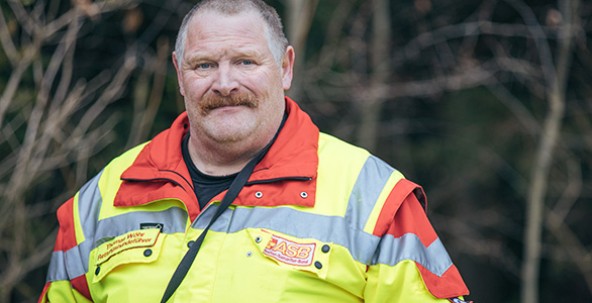
Rudi, look!
Thomas Wöhr is a machine fitter at Liebherr-Hyrdaulikbagger GmbH in Kirchdorf an der Iller. Thomas and his dog Rudi have volunteered with the ASB Orsenhausen Rescue Dog Unit for more than seven years. 53-year-old Thomas keeps his pager with him at all times. It can go off at any time of the day or night, alerting him to the fact that someone has gone missing. From then on, every second counts.
How long have you worked at Liebherr? What are your main duties?
Thomas Wöhr: I started training as a machine fitter at Liebherr-Hyrdaulikbagger GmbH in Kirchdorf an der Iller in September 1981. I have worked in various departments since then. I am currently working in the motor pre-assembly department. I am also the first aider and safety officer for my department.
Where and since when have you worked as a volunteer and what do you do specifically?
Thomas Wöhr: I have volunteered with the ASB Orsenhausen Rescue Dog Unit for seven and a half years. My dog Rudi is a flat-coated retriever and a certified rescue dog. We have to retake the rescue dog test every two years. The rescue control centre sends me an alert on my pager if someone has gone missing. When I arrive at the scene, the Incident Commander shows the area that I’ve got to search. I then have to carry out a thorough search of the entire area as quickly as possible. Even though we don’t always find the missing person, it helps the police to rule this area out of their investigations. We meet twice a week for training to ensure that everything runs smoothly. We train with our dogs in different types of environments and we also have theory lessons. We learn things such as how to work with a compass or what we should be aware of in emergency situations.

Why do you volunteer? How did the decision come about?
Thomas Wöhr: I got Rudi nine years ago when he was a puppy. I knew then that I wanted to find him something useful to do. I got an insight into the type of work rescue dogs do when we attended a puppy training course with the ASB Orsenhausen Rescue Service. I was really inspired by what I saw. That’s why I decided to train to become a rescue dog handler and I haven’t regretted this decision for a moment. The work gives you a real sense of purpose and it has somehow changed my life.
Even though we don’t always find the missing person, it helps the police to rule this area out of their investigations.
What is your most memorable experience?
Thomas Wöhr: I can’t really say. Each incident we are called out to is unique. We never know what to expect and whether the search will be successful.
How do you ensure that your voluntary work and your professional life do not conflict with each other?
Thomas Wöhr: I am free to leave work whenever I am needed for a search and rescue mission. If I’m at work and I’m called to an incident, I can leave straight away. So, it all works very well. However, it can sometimes be tiring if I’ve been called out during the night and then have to be fit for work again the next day. But this is outweighed by my enthusiasm for my voluntary work.
Why would you recommend volunteering to everyone?
Thomas Wöhr: Many activities simply wouldn’t be possible at all nowadays without the support of volunteers. The work is demanding, but you can get a lot back from it. For me, volunteering is something really special and the team spirit in my unit is amazing. We make a really great team!
The factory fire brigade of Liebherr-Werk Nenzing GmbH
The Liebherr plant fire brigade in Nenzing was founded in 1995 and currently consists of 26 members. They volunteer an average of 500 hours a year of their time to serve the public. In addition to the responsibility on the company premises, the factory’s fire brigade also provides support during working hours in the town of Nenzing. The 20 or so missions per year are mainly technical missions. The fire service fleet currently consists of three fire-fighting vehicles. A tank fire-fighting vehicle, a small fire-fighting vehicle with portable fire-fighting pump for water transport and a crew transport vehicle with special equipment such as a thermal imaging camera and gas measuring device for initial reconnaissance by the head of operations.
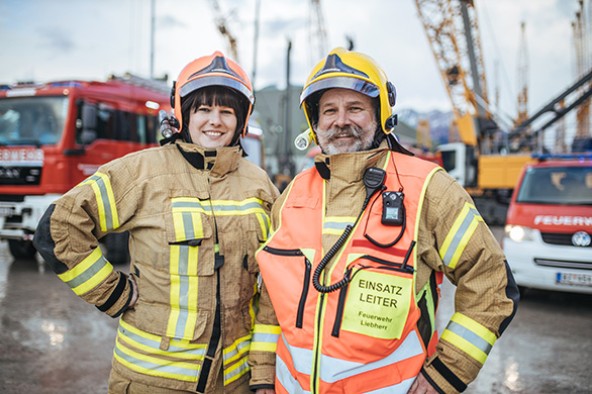
Water march!
Carola Rauscher was practically born to volunteer. Her own father was a volunteer firefighter. She has been a volunteer firefighter with the Thüringen Fire Service in Austria since the age of 14 and has served as a youth leader there for one year. She is a Warranty Coordinator at the Liebherr-Werk Nenzing and has also been a member of the factory’s fire crew for three years.
Alexander Loretz is a firefighter to his very core. The 51-year-old has worked as a volunteer firefighter with the Bartholomäberg Fire Service for over 30 years. He currently serves as the Deputy Group Commander. He is also the Section Commander of the Aussermontafon Fire Service and Chief Fire Officer at Liebherr-Werk Nenzing GmbH. Alexander’s volunteering roles fit very nicely with his professional duties at Liebherr where he is a Fire Protection Officer.
How long have you worked at Liebherr? What are your main duties?
Carola Rauscher: I started my apprenticeship at Liebherr-Werk Nenzing GmbH in 2008 as an office administrator. I then spent some years working in spare parts production and have been a Warranty Coordinator since 2016. I am primarily responsible for processing warranty claims which are sent to us from our branch offices all around the world.
Alexander Loretz: I have worked as a Fire Protection Officer at Liebherr-Werk Nenzing for 25 years and have served as the factory’s Chief Fire Officer for 24 years.
I spent a lot of time at the fire station when I was a child.
Where and since when have you worked as a volunteer and what do you do specifically?
Carola Rauscher: I started off as a volunteer in the Youth Fire Brigade at the Thüringen Fire Department. I have been volunteering there as a firefighter and youth leader ever since. My role as a youth leader involves taking care of the fire cadets and organising all the activities and operations. I have been a member of the Liebherr factory fire crew since 2016.
Alexander Loretz: In addition to my role as Chief Fire Officer at Liebherr, I have served as the Deputy Group Commander of the Bartholomäberg Fire Service for many years. I also volunteer as the Section Commander at the Aussermontafon Fire Service. I am therefore responsible for five local fire brigades and one factory fire crew.
Why do you volunteer? How did the decision come about?
Carola Rauscher: My father was a volunteer firefighter and so it was in my DNA. I spent a lot of time at the fire station when I was a child. They let me go for rides in the fire engines. When I was 12, they invited me to join the Youth Fire Brigade and I jumped at the chance. I love the team spirit and working with the cadets is brilliant.
Alexander Loretz: I have always wanted to help people and protect them from harm. So, I decided to join the Bartholomäberg Fire Service when I was a teenager and have been involved there ever since.

What is your most memorable experience?
Carola Rauscher: My first operation for sure. I can still remember how nervous I felt when the control centre reported a “house on fire”. We and the neighbouring brigades rushed to the scene. But it turned out to be a flower pot that had caught fire.
Alexander Loretz: I have worked as a firefighter for many years and have seen and experienced many things during that time. The Whitsun floods of 1999 are definitely etched into my memory.
I have worked as a firefighter for many years and have seen and experienced many things during that time.
How do you ensure that your voluntary work and your professional life do not conflict with each other?
Carola Rauscher: It works out really well. I can respond to emergency call-outs during working hours whether it’s as part of the factory fire crew or for the local fire department. I appreciate this very much.
Alexander Loretz: It usually works out very well for me. There is a good deal of overlap between my role as a Fire Protection Officer and my volunteering. I reap the benefits from both sides. During the day at work and then during the evenings with the local and section fire brigades.
Why would you recommend volunteering to everyone?
Carola Rauscher: Volunteering for the fire service means that you learn a lot of useful things that help you in your everyday life – more than just how to put out fires! For example, I know exactly what to do in the event of a road traffic accident or if someone needs first aid. The camaraderie is also amazing. We are all there for each other and help out wherever we can. It doesn’t matter if you’re big or small, young or old – the team always sticks together.
Alexander Loretz: Volunteering is invaluable and absolutely essential. It would not be possible to ensure that people in need of help would be reached in time without the commitment of so many volunteers. The fact that my comrades and I can provide rapid and professional assistance to people in emergency situations gives me a great deal of pleasure. This binds the teams closely together and we have some great times with each other.
Operation exercise at the Liebherr plant in Nenzing
* In order to guarantee better readability we only use the male form, with latter being representative of a gender-neutral designation. When doing so, we always address all gender identities (m/f/d).

